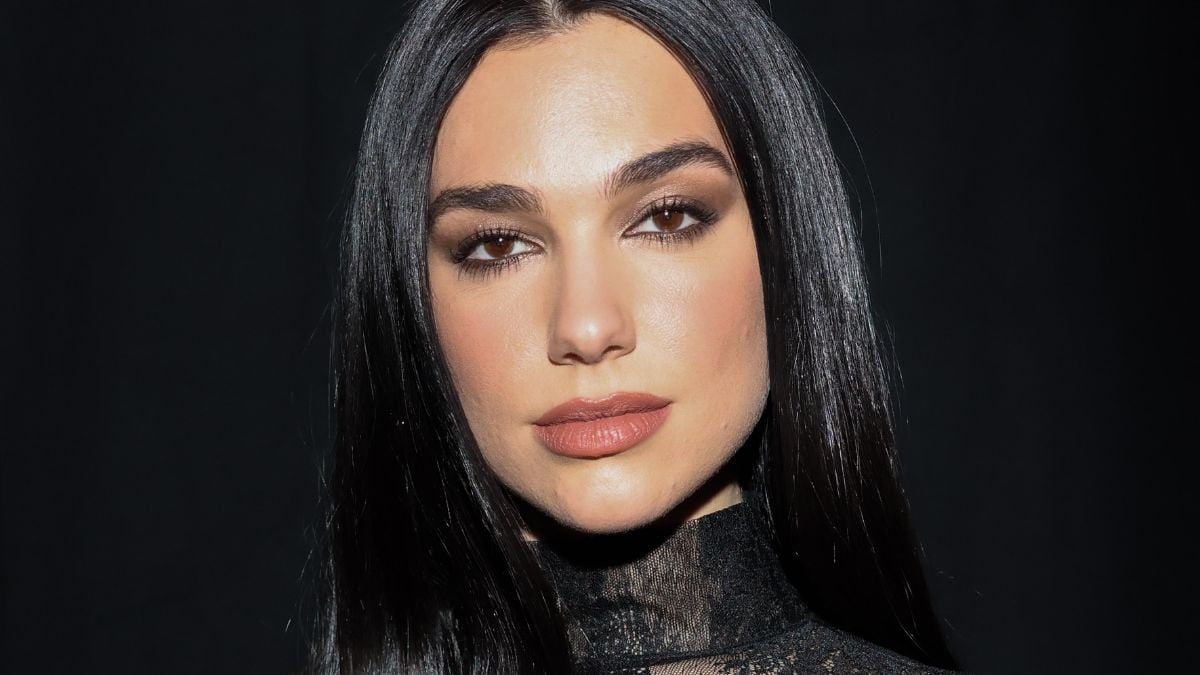When you hear the name Dua Lipa, what comes to mind? A global pop icon? A fashionista? Or maybe the queen of dance-pop music? Well, yeah, all of that—but there’s so much more to her story. Today, we’re diving deep into the world of Dua Lipa, exploring her ethnicity and how it has shaped her journey to becoming one of the biggest names in the music industry. So, buckle up, because this ride is gonna be wild, and trust me, you won’t want to miss a beat!
Dua Lipa isn’t just another pop star. She’s a trailblazer, a cultural phenomenon, and someone who has redefined what it means to be a global artist. But her story didn’t start with sold-out concerts or chart-topping hits. It started with her roots, her heritage, and the diverse influences that have shaped her career. If you’ve ever wondered how her background plays a role in her success, you’re in the right place.
In this article, we’ll explore Dua Lipa’s ethnicity, the cultural influences that have molded her music, and how she’s used her unique background to carve out a space for herself in the competitive world of pop. Let’s get started, shall we?
Read also:Discover The Flavorful World Of Faiccos Italian Specialties
Table of Contents:
- Biography: Who is Dua Lipa?
- Dua Lipa’s Ethnicity: A Blend of Cultures
- Family Background and Roots
- How Her Ethnicity Influences Her Music
- Cultural Influences in Fashion
- The Role of Ethnicity in Her Success
- Challenges Faced Along the Way
- Global Impact and Representation
- Connecting with Fans Through Her Heritage
- What’s Next for Dua Lipa?
Biography: Who is Dua Lipa?
Dua Lipa, born on August 22, 1995, in London, England, is not just a singer but a cultural icon who has taken the world by storm. Her full name, Dua Lipa Dragusha, might give you a hint about her rich and diverse background. Before she became the queen of pop, she was a little girl with big dreams growing up in a multicultural household.
Early Life and Background
Let’s rewind to the beginning. Dua Lipa was born into a family with deep ties to Albania. Her parents, Dukagjin and Anesa Lipa, are both Albanian immigrants who moved to the UK in the late 1980s. This blend of British and Albanian cultures has played a huge role in shaping who she is today. From an early age, Dua was exposed to a mix of traditions, languages, and music styles, which would later influence her career in unexpected ways.
Here’s a quick rundown of her early life:
- Born in London, but spent part of her childhood in Kosovo.
- Grew up surrounded by music, thanks to her father, who was a musician and founder of the rock band Rocking G.
- Began performing at a young age, appearing in school plays and talent shows.
But don’t just take my word for it. Let’s dive deeper into her roots and see how her ethnicity has shaped her journey.
Dua Lipa’s Ethnicity: A Blend of Cultures
When it comes to Dua Lipa, her ethnicity is more than just a label—it’s a key part of who she is. She’s a proud Albanian-British artist who wears her heritage like a badge of honor. But what exactly does that mean? Let’s break it down.
Read also:Undressing Ai A Sneak Peek Into The Future Of Technology
The Albanian Connection
Dua’s parents hail from Albania, and their move to the UK in the late 1980s was driven by a desire for a better life. Growing up, Dua was surrounded by Albanian traditions, food, and music. Her family’s love for their homeland has always been a source of inspiration for her.
Here’s a fun fact: Dua’s name means “love” in Albanian, which gives you a glimpse into the importance of her heritage in her life. Her connection to Albania runs deep, and she often talks about how proud she is of her roots.
But it’s not just about her family. Dua’s ethnicity has also influenced her music, her fashion choices, and even her public persona. It’s a big part of what makes her so unique in the music industry.
Family Background and Roots
Let’s talk about Dua’s family because, let’s be real, they’re a huge part of her story. Her parents, Dukagjin and Anesa Lipa, have been instrumental in shaping her career and her worldview. Her father, in particular, was a huge influence on her love for music. As the founder of the rock band Rocking G, he introduced her to the world of live performances and studio recording at a young age.
Here’s a quick look at her family:
| Name | Relation | Occupation |
|---|---|---|
| Dukagjin Lipa | Father | Musician (Rocking G) |
| Anesa Lipa | Mother | Homemaker |
| Gjin Lipa | Brother | Music Producer |
As you can see, music runs in the family. And if you’ve ever wondered why Dua’s music is so authentic and heartfelt, her family background might just be the answer.
How Her Ethnicity Influences Her Music
Now, let’s get to the heart of the matter: how does Dua Lipa’s ethnicity influence her music? If you’ve ever listened to her songs, you might have noticed a unique blend of pop, dance, and even traditional Balkan sounds. That’s no accident. Her Albanian roots have played a huge role in shaping her musical style.
Traditional Sounds in Modern Music
One of the most fascinating aspects of Dua’s music is how she incorporates traditional Albanian sounds into her modern pop tracks. For example, her hit song “Levitating” features a catchy, upbeat rhythm that draws inspiration from Balkan folk music. It’s this fusion of old and new that makes her music so appealing to a global audience.
But it’s not just about the music. Dua’s lyrics often reflect her cultural identity, touching on themes of love, identity, and belonging. She’s not afraid to be vulnerable and share her experiences as a multicultural artist, and that’s something her fans appreciate.
Cultural Influences in Fashion
When it comes to fashion, Dua Lipa is a force to be reckoned with. She’s known for her bold, eclectic style that often draws inspiration from her Albanian heritage. Whether it’s a traditional Albanian dress or a modern interpretation of Balkan fashion, Dua knows how to make a statement.
From Traditional to Avant-Garde
Dua’s fashion choices are a reflection of her cultural identity. She’s not afraid to mix and match different styles, creating a look that’s uniquely her own. From glamorous red carpet outfits to casual streetwear, she always manages to incorporate elements of her Albanian roots into her wardrobe.
And let’s not forget her love for bold colors and patterns. If you’ve ever seen her on stage or in a music video, you’ll notice how she uses fashion to express her personality and cultural background. It’s a testament to her confidence and creativity.
The Role of Ethnicity in Her Success
So, how has Dua Lipa’s ethnicity contributed to her success? Well, it’s more than just a coincidence. Her multicultural background has given her a unique perspective that sets her apart from other artists. It’s allowed her to connect with fans from all over the world, transcending cultural and language barriers.
A Global Artist with Local Roots
Dua’s ability to blend different cultures and traditions into her music and public persona has been a key factor in her success. She’s not just a pop star; she’s a cultural ambassador who represents the global nature of modern music. Her fans love her because she’s authentic, relatable, and unapologetically herself.
And let’s not forget the impact of social media. Dua uses platforms like Instagram and TikTok to share her life, her music, and her heritage with millions of fans around the world. It’s this genuine connection that has helped her build a loyal fanbase.
Challenges Faced Along the Way
Of course, Dua’s journey hasn’t been without its challenges. As a multicultural artist, she’s faced her fair share of obstacles, from stereotypes to cultural misunderstandings. But instead of letting these challenges hold her back, she’s used them as fuel to drive her success.
Breaking Barriers and Shattering Stereotypes
Dua Lipa has always been a trailblazer, and she’s not afraid to challenge the status quo. Whether it’s through her music, her fashion, or her public statements, she’s constantly pushing boundaries and redefining what it means to be a global artist. It’s this fearless approach that has earned her respect and admiration from fans and critics alike.
Global Impact and Representation
Dua Lipa’s impact extends far beyond the music industry. She’s become a symbol of representation and diversity, inspiring countless fans around the world. Her success proves that you don’t have to fit into a certain mold to make it in the entertainment industry.
Empowering the Next Generation
For many young artists, especially those from multicultural backgrounds, Dua is a role model. She’s shown them that it’s possible to embrace your heritage while pursuing your dreams. And that’s a powerful message that resonates with people of all ages and backgrounds.
Connecting with Fans Through Her Heritage
One of the most beautiful aspects of Dua Lipa’s career is how she connects with her fans through her heritage. Whether it’s through her music, her fashion, or her public appearances, she always finds ways to share her cultural identity with the world. And her fans love her for it.
A Global Community
Dua’s fans come from all walks of life, and they’re united by their love for her music and her cultural background. It’s this sense of community that makes her so special. She’s not just a pop star; she’s a cultural icon who has brought people together in a way that few artists can.
What’s Next for Dua Lipa?
So, what’s next for Dua Lipa? Well, if her past is any indication, the sky’s the limit. With her unique blend of talent, charisma, and cultural identity, she’s poised to continue breaking records and redefining the music industry. Whether it’s new music, fashion collaborations, or humanitarian work, Dua is sure to keep us entertained and inspired for years to come.
And let’s not forget her commitment to representation and diversity. As she continues to rise to new heights, she’ll undoubtedly use her platform to amplify marginalized voices and promote inclusivity in the entertainment industry.
There you have it, folks—a deep dive into Dua Lipa’s ethnicity and how it has influenced her journey to success. From her Albanian-British roots to her global impact, Dua is a true cultural icon who has redefined what it means to be a pop star. So, the next time you listen to one of her songs or see her on the red carpet, remember the rich cultural heritage that has shaped her career.
But don’t just stop here. Share this article with your friends


